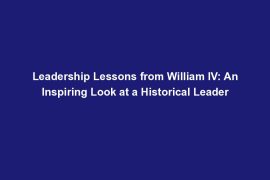Hey there, history buffs and aspiring leaders! Today, we’re diving into the fascinating world of King Edward VII’s leadership style and the valuable lessons it offers for modern leaders like you and me.
King Edward VII, also known as the Uncle of Europe, was a charismatic and influential leader who reigned over the United Kingdom in the early 20th century. His approach to leadership was marked by his ability to build strong relationships and alliances both domestically and internationally. By utilizing diplomacy and charm, he was able to strengthen ties with other countries and maintain a network of advisors and supporters that helped him navigate complex political landscapes.
In today’s fast-paced and interconnected world, studying historical figures like King Edward VII can provide us with valuable insights on effective leadership and decision-making. By understanding how he balanced tradition with progress, adapted to change, and built strong relationships, we can learn how to enhance our own leadership skills in the modern era.
So, get ready to uncover the key leadership lessons from King Edward VII and how you can apply them to your own leadership journey. Let’s explore how his legacy continues to inspire and guide leaders in today’s ever-evolving world. Grab a cup of tea and let’s dive in!
Key Leadership Lessons from Edward VII
Now that we have a better understanding of King Edward VII’s leadership style, let’s dive into some key lessons that modern leaders can learn from his reign.
Building strong relationships and alliances
One of the most notable aspects of King Edward VII’s leadership was his ability to build strong relationships and alliances both domestically and internationally. By utilizing diplomacy and charm, he was able to strengthen international relations and maintain a network of advisors and supporters who helped him navigate the complexities of governance.
In today’s globalized world, building alliances and partnerships is more important than ever. Modern leaders can learn from Edward VII’s example by developing diplomatic skills and forging strong relationships with other countries and stakeholders.
Adaptability and flexibility in leadership
Another key lesson from King Edward VII is the importance of adaptability and flexibility in leadership. He was quick to embrace change and innovation in governance and policy-making, allowing him to respond effectively to challenges and crises that arose during his reign.
Modern leaders can benefit from this lesson by being open to new ideas and approaches, and by being prepared to pivot in the face of changing political, economic, and social landscapes. The ability to adapt and respond to unexpected circumstances is crucial in today’s fast-paced world.
Balancing tradition with progress
Finally, King Edward VII’s reign also exemplified the importance of balancing tradition with progress. While he respected history and tradition, he also drove modernization and reform, fostering a sense of continuity and stability in times of change.
Modern leaders can learn from this lesson by finding ways to honor the past while championing progress and innovation. By striking a balance between tradition and progress, leaders can ensure that their decisions are grounded in history while also moving their organizations forward into the future.
By studying King Edward VII’s leadership style and the lessons it offers, modern leaders can gain valuable insights into effective leadership and decision-making. In the next section, we’ll explore how these principles can be applied in the modern world through real-life examples and practical tips.
Applying Edward VII’s Leadership Principles in the Modern World
Now that we’ve delved into the key leadership lessons from King Edward VII, let’s explore how his principles can be applied in the modern world. It’s incredible to see how timeless leadership qualities can transcend centuries and still hold relevance in today’s fast-paced and ever-changing society.
Case studies of modern leaders who exemplify Edward VII’s leadership principles
Take, for instance, Angela Merkel, the former Chancellor of Germany, who excelled in building alliances and partnerships in a globalized world. Known for her diplomatic skills and ability to navigate complex international relationships, Merkel’s leadership style echoes Edward VII’s approach to international diplomacy.
Another example is Jacinda Ardern, the Prime Minister of New Zealand, who showcased adaptability and flexibility in her response to the Christchurch mosque shootings. By demonstrating empathy, decisiveness, and unity, Ardern embodied the qualities of a true leader faced with a crisis.
How modern leaders can imbibe Edward VII’s leadership legacy
So, how can aspiring leaders channel their inner Edward VII? One way is to focus on developing diplomatic skills and building strong relationships in leadership roles. By nurturing alliances and fostering connections, leaders can effectively navigate the complex web of interpersonal dynamics in modern governance.
Moreover, implementing strategies to balance tradition and progress in decision-making processes is crucial for sustainable leadership. Just like Edward VII managed to respect history while embracing innovation, modern leaders must find the delicate equilibrium between honoring the past and driving towards a better future.
In essence, Edward VII’s leadership legacy serves as a guiding light for today’s leaders, offering valuable insights into the art of diplomacy, adaptability, and tradition. By studying historical figures like Edward VII, modern leaders can gain a deeper understanding of effective leadership practices and make a lasting impact in their respective fields.



